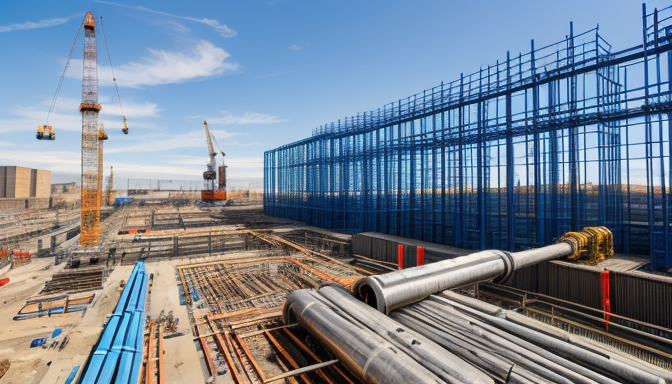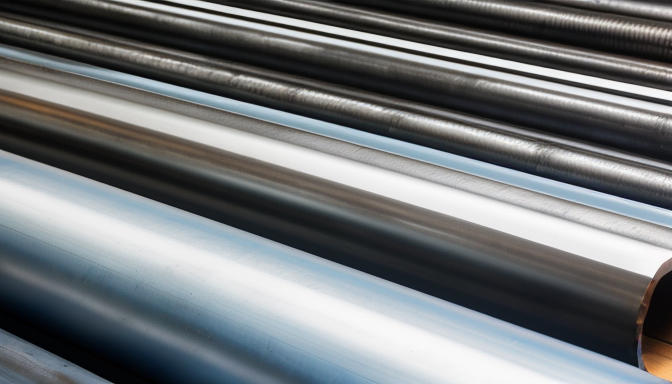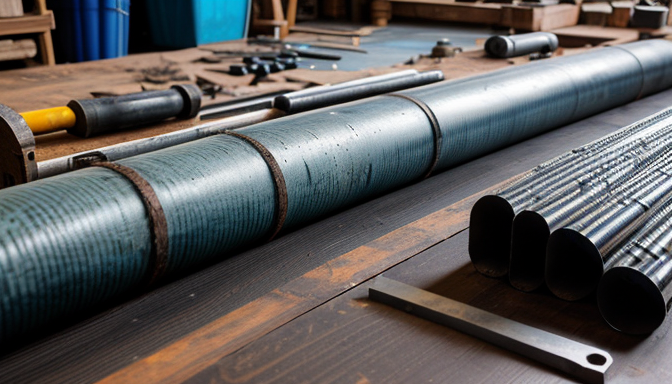When you think of construction and manufacturing, thick-walled steel pipes might not be the first thing that comes to mind. But these pipes play a crucial role in various industries. They are like the unsung heroes of construction, providing strength and support where it’s needed most. Imagine a sturdy backbone; that’s what these pipes offer to structures, ensuring they stand tall and strong.
So, what exactly are thick-walled steel pipes? Simply put, they are pipes made from steel that have a thicker wall compared to standard pipes. This added thickness gives them unique properties that make them ideal for heavy-duty applications. Think of them as the heavyweight champions in the world of pipes – built to handle pressure and stress without breaking a sweat.
But why should you care about thick-walled steel pipes? Well, if you’re involved in any construction project, understanding these pipes can save you time and money. They are often used in the oil and gas industry, construction of buildings, and even in manufacturing processes. Their ability to withstand extreme conditions makes them a popular choice for many engineers and contractors.
In the following sections, we’ll dive deeper into the price, weight, properties, and sizes of thick-walled steel pipes. Each of these aspects is vital for anyone considering using them in their projects. You’ll learn how to budget effectively, select the right pipe for your needs, and understand the benefits they bring to the table. So, let’s get started!
Thick-Walled Steel Pipe Price
The cost of thick-walled steel pipes can vary significantly. Why is that? Well, several factors come into play. First, we need to consider the material quality. Higher quality steel usually means a higher price tag. Think of it like buying a car. A luxury model will cost you more than a basic one, right?
Next up is the manufacturing process. Pipes made with advanced techniques often carry a premium. This is because they might be more durable or have specific certifications. For example, if you’re in construction, you want pipes that can withstand the test of time and pressure. Nobody wants to deal with a pipe that cracks under stress!
Market demand also plays a huge role. When demand is high, prices tend to rise. It’s basic economics. Imagine a popular concert. Tickets sell out fast, and the prices skyrocket. The same goes for steel pipes. If a big construction project is underway, suppliers may increase prices due to demand.
Here’s a quick breakdown of what influences the price:
- Material Quality: Higher quality means higher costs.
- Manufacturing Process: Advanced techniques can add to the price.
- Market Demand: Prices rise when demand is high.
To give you a clearer picture, let’s look at a simple table showing average prices based on pipe diameter:
| Diameter (inches) | Average Price (per foot) |
|---|---|
| 4 | $20 |
| 6 | $30 |
| 8 | $40 |
| 10 | $50 |
As you can see, the price increases with the diameter. This is important when budgeting for your project. It’s always a good idea to shop around and compare prices. You might find significant differences between suppliers.
In conclusion, understanding the factors that influence the price of thick-walled steel pipes is essential. It helps you make informed decisions for your construction or manufacturing needs. Remember, a little research can save you a lot of money!

Thick-Walled Steel Pipe Weight
The weight of thick-walled steel pipes is a crucial factor in construction and manufacturing. Why? Because it directly affects several aspects of a project. From transportation costs to installation challenges, understanding the weight of these pipes can save you both time and money.
Imagine trying to lift a heavy steel pipe without knowing its weight. It could lead to accidents or delays. Therefore, knowing the weight beforehand is essential for planning. Typically, the weight of thick-walled steel pipes is determined by their diameter and wall thickness. The thicker the wall, the heavier the pipe. This relationship can be visualized in the following table:
| Pipe Diameter (inches) | Wall Thickness (inches) | Weight (lbs per foot) |
|---|---|---|
| 4 | 0.250 | 14.0 |
| 6 | 0.280 | 21.0 |
| 8 | 0.322 | 32.0 |
| 10 | 0.365 | 42.0 |
As you can see, the weight can vary significantly based on the size and thickness of the pipe. This means that if you’re working on a project that involves transporting these pipes, you need to consider the total weight. How will you move them? Will you need special equipment?
Moreover, the weight also plays a role in the structural integrity of the project. Heavier pipes can provide better support in certain applications, but they also require stronger foundations. Think about it: if you’re building a structure that needs to withstand heavy loads, using the right weight of pipe is non-negotiable.
In conclusion, understanding the weight of thick-walled steel pipes is not just a matter of numbers. It’s about ensuring safety, efficiency, and effectiveness in your projects. So, the next time you’re selecting pipes, remember to weigh your options—literally!
Thick-Walled Steel Pipe Properties
When it comes to thick-walled steel pipes, understanding their properties is like knowing the secret sauce in a delicious recipe. These pipes are not just ordinary tubes; they’re designed for strength and durability. So, what makes them stand out?
First off, one of the most impressive characteristics is their high tensile strength. This means they can withstand a lot of pressure without breaking. Imagine trying to crush a soda can. Now think of a thick-walled steel pipe. The latter can handle far more force without so much as a dent. This property makes them ideal for heavy-duty applications, such as transporting oil and gas or supporting heavy structures.
Another noteworthy property is their corrosion resistance. Thick-walled steel pipes can be treated or coated to resist rust and other forms of deterioration. This is crucial, especially in environments where moisture or chemicals are present. Just like how a raincoat protects you from getting wet, these pipes are shielded from the elements, ensuring a longer lifespan.
Additionally, they offer excellent thermal conductivity. This means they can effectively transfer heat. In industrial settings, this is vital. Think about how you wouldn’t want your hot coffee to cool down too quickly. Similarly, these pipes help maintain the desired temperature of the fluids passing through them.
Now, let’s talk about dimensions. Thick-walled steel pipes come in various sizes, which means they can be tailored to fit specific needs. Whether you need a pipe for a small project or a massive construction site, there’s likely a thick-walled steel pipe that fits the bill. Here’s a quick look at some common sizes:
| Pipe Diameter (inches) | Wall Thickness (inches) | Applications |
|---|---|---|
| 2 | 0.250 | Water supply, HVAC |
| 4 | 0.500 | Oil and gas transport |
| 6 | 0.750 | Structural supports |
In summary, thick-walled steel pipes are more than just pipes. They are robust, reliable, and versatile. With their high tensile strength, corrosion resistance, and thermal conductivity, they play a crucial role in various industries. Whether you’re involved in construction or manufacturing, knowing these properties can help you make informed decisions. Just like picking the right tool for a job, choosing the right pipe can make all the difference.

Thick-Walled Steel Pipe Sizes
This article explores various aspects of thick-walled steel pipes, including their price, weight, properties, sizes, and uses, providing a comprehensive understanding of this essential material in construction and manufacturing.
When it comes to thick-walled steel pipes, size truly matters. Imagine trying to fit a square peg in a round hole. If the sizes don’t match, you’re in for a world of trouble. Thick-walled steel pipes are available in a variety of dimensions to cater to different engineering needs. Knowing the right size is crucial for ensuring that your project runs smoothly and efficiently.
Typically, these pipes are categorized by their nominal pipe size (NPS), which is a standardized way of describing the diameter of the pipe. The NPS doesn’t always directly correlate with the actual diameter, but it provides a useful reference point. Most thick-walled steel pipes range from ½ inch to 36 inches in nominal size. However, larger sizes can be custom-made for specialized applications.
Here’s a quick breakdown of some common sizes:
| Nominal Pipe Size (NPS) | Outer Diameter (OD) in inches | Wall Thickness (inches) |
|---|---|---|
| 1 | 1.315 | 0.133 |
| 2 | 2.375 | 0.154 |
| 3 | 3.500 | 0.216 |
| 4 | 4.500 | 0.237 |
| 6 | 6.625 | 0.280 |
These measurements are just a glimpse into the world of thick-walled steel pipes. Each project might call for a different size based on its specific requirements. For example, if you’re working on a construction site that needs to support heavy loads, you’ll want to opt for larger diameters with thicker walls. On the flip side, if you’re dealing with smaller-scale plumbing or gas lines, you might find that a smaller diameter does the trick.
One important thing to consider is that the size of the pipe also affects its weight and cost. Larger pipes weigh more, which can increase transportation costs and complicate installation. So, always keep your project’s budget and logistical considerations in mind when selecting the size of your thick-walled steel pipes.
In summary, understanding the sizes of thick-walled steel pipes is essential for any construction or manufacturing project. Whether you’re a seasoned engineer or a DIY enthusiast, knowing what you need can save you time, money, and a whole lot of headaches.
Frequently Asked Questions
- What factors affect the price of thick-walled steel pipes?
The price of thick-walled steel pipes can fluctuate based on a variety of factors, including the quality of the material, the manufacturing processes used, and current market demand. For instance, if there’s a surge in construction projects, prices may rise due to increased demand. It’s essential to keep these factors in mind when budgeting for your projects.
- How does the weight of thick-walled steel pipes impact their use?
Weight is a significant consideration when dealing with thick-walled steel pipes. Heavier pipes can be more challenging to transport and install, which could lead to higher labor costs. Additionally, the weight affects the structural integrity of the overall system, so it’s crucial to choose the right weight for your specific application to ensure safety and efficiency.
- What are the key properties of thick-walled steel pipes?
Thick-walled steel pipes are known for their high tensile strength and durability. These properties make them ideal for demanding applications, such as oil and gas transportation and structural support in heavy-duty environments. Their ability to withstand extreme conditions is what sets them apart from other materials.
- What sizes are available for thick-walled steel pipes?
Thick-walled steel pipes come in a variety of sizes to accommodate different engineering needs. It’s vital to know the dimensions available to ensure compatibility with existing systems and to optimize performance in various applications. Always check the specifications before making a purchase to avoid any mismatches.
- Are thick-walled steel pipes suitable for all types of construction projects?
While thick-walled steel pipes are incredibly versatile, they may not be necessary for every project. Their strength and durability make them perfect for heavy-duty applications, but for lighter constructions, other materials might be more cost-effective. Assess your project’s specific requirements to determine if thick-walled steel pipes are the right fit.
